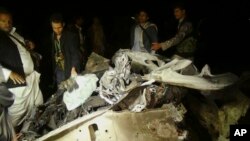A series of Islamic State-claimed bombings in Yemen's rebel-controlled capital killed at least four people and wounded 60 Wednesday night amid the country's raging war.
The online claim, if true, would further complicate the ongoing conflict in Yemen that pits Shi'ite rebels known as Houthis and breakaway army units against an array of often rival forces, including local tribesmen, loyalists to the exiled President Abdu Rabu Mansour Hadi and al-Qaida militants.
The bombings came on the eve of the holy month of Ramadan, when radical Sunni militants around the region often escalate their attacks against Shi’ites, whom they view as heretics.
Also Wednesday, airstrikes by a Saudi-led coalition backing Hadi struck a convoy of civilian vehicles in the southern city of Aden, killing at least 31 people, authorities said.
In Sana’a, ambulances rushed through the streets in northern and central parts of the capital where the offices of the rebels are located. Pictures posted online from the area show huge, orange flames rising from the areas, which also are home to Shi’ite mosques.
Security officials earlier said two suicide attackers drove car bombs into the gates of two buildings before detonating them. They said a third attack targeted a gathering of Houthis in Sana’a's Green Dome district.
The Health Ministry said “preliminary” reports indicated the blasts killed four people and wounded 60.
The online statement claiming Yemen's Islamic State affiliate carried out the attack said its militants set off four car bombs outside two Shi’ite mosques, including in the Green Dome district, which is close to a security office used by the Houthis. The third car bomb hit the Houthis' main political office, and a fourth targeted the home of a Houthi politician on the same street, it said.
The Islamic State group, which now controls a third of both Iraq and Syria in its self-declared caliphate, has had its Yemen affiliate claim attacks in the country before. In March, just before the Saudi-led coalition began its airstrike campaign, the affiliate, which refers to itself as the Sana’a province, claimed responsibility for a series of suicide bombings in Sana’a targeting Shi’ites that killed at least 137 people and wounded 345. American officials initially expressed skepticism that the affiliate existed, as Yemen is also home to the world's most dangerous al-Qaida offshoot.
The al-Qaida branch, whose leader was killed in a U.S. drone strike last week, has targeted the Houthis in dozens of deadly attacks, and its militants are engaged in near-daily attacks in central Yemen.
U.N.-brokered talks between the rival factions in Yemen's civil war are underway in Geneva, aimed at ending the violence and addressing the humanitarian crisis in the Arab world's poorest country. Mediators hope for a humanitarian truce during Ramadan, which starts Thursday, but neither side has shown any desire to compromise.
The earlier Saudi-led airstrikes struck a convoy of civilian vehicles fleeing north from Aden, which has seen intense fighting. Medics described a scene of carnage, with body parts scattered across the highway and smoke billowing from charred vehicles.
Despite nearly three months of airstrikes, anti-Houthi forces have made little progress. The Saudi-led campaign and ground fighting also have taken a high humanitarian toll. The violence has killed at least 1,412 civilians, including more than 200 children, and wounded 3,423, according to the United Nations. Aid groups say 80 percent of the population is in need of assistance.
Also Wednesday, heavy fighting was underway in the oil and gas-rich Marib province east of Sana’a, where Sunni tribes have fended off a number of Houthi advances on the city of al-Saheel, security officials said. Airstrikes targeted the Houthis in Marib as well as in Sana’a, Aden, the rebels' northern heartland and the western city of Taiz, they said.
In Taiz, Houthi shelling has killed more than 30 civilians in the past 48 hours, medical officials and witnesses said. The rebels control a third of the city.
All officials spoke on condition of anonymity as they were not authorized to speak to journalists.
In a country already suffering from shortages of fuel, water and medical supplies, the fighting endangers hospitals as well. A report released Wednesday by Human Rights Watch accused the Houthis and their rivals of turning a main hospital in Aden called al-Jumhouria into a war zone.
In one incident April 19, the group said hundreds of southern fighters forced staffers to locate wounded Houthis receiving treatment there. Human Rights Watch says at least two of the wounded were shot dead outside the hospital.
“The fighting in Yemen is terrible enough without both sides bringing the battle into hospitals,” said Joe Stork, deputy Middle East and North Africa director at Human Rights Watch.




